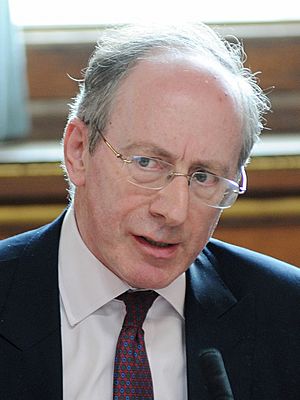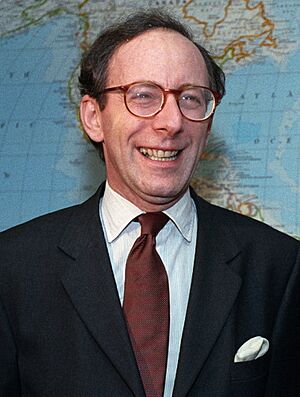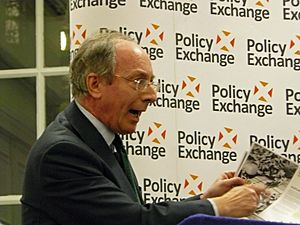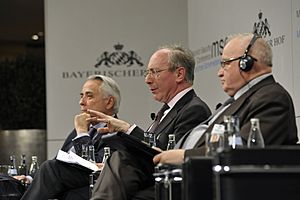Malcolm Rifkind facts for kids
Quick facts for kids
Malcolm Rifkind
|
|||||||||||||||||||||||||||||||||||
|---|---|---|---|---|---|---|---|---|---|---|---|---|---|---|---|---|---|---|---|---|---|---|---|---|---|---|---|---|---|---|---|---|---|---|---|

Rifkind in 2011
|
|||||||||||||||||||||||||||||||||||
| Secretary of State for Foreign and Commonwealth Affairs | |||||||||||||||||||||||||||||||||||
| In office 5 July 1995 – 2 May 1997 |
|||||||||||||||||||||||||||||||||||
| Prime Minister | John Major | ||||||||||||||||||||||||||||||||||
| Preceded by | Douglas Hurd | ||||||||||||||||||||||||||||||||||
| Succeeded by | Robin Cook | ||||||||||||||||||||||||||||||||||
| Secretary of State for Defence | |||||||||||||||||||||||||||||||||||
| In office 10 April 1992 – 5 July 1995 |
|||||||||||||||||||||||||||||||||||
| Prime Minister | John Major | ||||||||||||||||||||||||||||||||||
| Preceded by | Tom King | ||||||||||||||||||||||||||||||||||
| Succeeded by | Michael Portillo | ||||||||||||||||||||||||||||||||||
| Secretary of State for Transport | |||||||||||||||||||||||||||||||||||
| In office 28 November 1990 – 10 April 1992 |
|||||||||||||||||||||||||||||||||||
| Prime Minister | John Major | ||||||||||||||||||||||||||||||||||
| Preceded by | Cecil Parkinson | ||||||||||||||||||||||||||||||||||
| Succeeded by | John MacGregor | ||||||||||||||||||||||||||||||||||
| Secretary of State for Scotland | |||||||||||||||||||||||||||||||||||
| In office 11 January 1986 – 28 November 1990 |
|||||||||||||||||||||||||||||||||||
| Prime Minister | Margaret Thatcher | ||||||||||||||||||||||||||||||||||
| Preceded by | George Younger | ||||||||||||||||||||||||||||||||||
| Succeeded by | Ian Lang | ||||||||||||||||||||||||||||||||||
|
|||||||||||||||||||||||||||||||||||
|
|||||||||||||||||||||||||||||||||||
|
|||||||||||||||||||||||||||||||||||
| Personal details | |||||||||||||||||||||||||||||||||||
| Born |
Malcolm Leslie Rifkind
21 June 1946 Edinburgh, Scotland |
||||||||||||||||||||||||||||||||||
| Political party | Conservative | ||||||||||||||||||||||||||||||||||
| Spouses |
Edith Steinberg
(m. 1970; died 2019)Jennifer (Sherrie) Bodie
(m. 2022) |
||||||||||||||||||||||||||||||||||
| Children |
|
||||||||||||||||||||||||||||||||||
| Alma mater | University of Edinburgh | ||||||||||||||||||||||||||||||||||
Sir Malcolm Leslie Rifkind (born 21 June 1946) is a British politician. He was a very important member of the UK government for many years. He served in the cabinets of Prime Ministers Margaret Thatcher and John Major from 1986 to 1997. More recently, he led the Intelligence and Security Committee of Parliament from 2010 to 2015. He is also known for supporting closer ties with Europe within his political party.
Rifkind was a Member of Parliament (MP) for Edinburgh Pentlands from 1974 to 1997. He held several important jobs as a government minister. These included being the Secretary of State for Scotland (1986–1990), Defence Secretary (1992–1995), and Foreign Secretary (1995–1997). In 1997, his party lost the election, and he lost his seat in Parliament.
He tried to get re-elected in 2001 but was not successful. The Edinburgh Pentlands area was later changed. In 2005, he was elected as the Conservative MP for Kensington and Chelsea. He considered running to be the leader of his party in 2005 but decided not to.
Rifkind was elected as the MP for Kensington in 2010. He was chosen to lead the Intelligence and Security Committee of Parliament by Prime Minister David Cameron. In 2015, he was asked to join a special panel on European Security. He did not run for Parliament in the 2015 election. After leaving Parliament, he became a visiting professor at King's College, London. He also became a Distinguished Fellow at the Royal United Services Institute. In 2016, he published his memoirs, a book about his life and experiences.
Contents
Early Life and Education
Malcolm Rifkind was born in Edinburgh, Scotland. His family came to Britain from Lithuania in the 1890s. He went to George Watson's College and then studied law at the University of Edinburgh. He also earned a postgraduate degree in political science. While at university, he traveled through the Middle East and India. He also appeared on the TV show University Challenge.
From 1967 to 1968, he worked as a lecturer in Rhodesia (now Harare). He became a lawyer in Scotland in 1970 and worked full-time until 1974. He was made a Queen's Counsel in 1985 and joined the Privy Council in 1986. From 1970 to 1974, he was a member of the Edinburgh City Council.
Becoming a Member of Parliament
Rifkind first tried to become an MP in 1970 but did not win. He was elected to Parliament in 1974, representing Edinburgh Pentlands. In 1975, he supported Margaret Thatcher when she became the leader of the Conservative Party. Thatcher made him a spokesman for Scottish affairs.
He later resigned from this role because he disagreed with his party's decision about a bill for a Scottish Assembly. Rifkind believed the party should have supported the bill. He voted in favor of the idea of a Scottish Assembly in a public vote. However, he changed his mind when the results showed Scotland was very divided on the issue.
Working as a Junior Minister
Malcolm Rifkind served as a minister for 18 years without a break. This was under both Margaret Thatcher and John Major. This is one of the longest times anyone has served as a minister in Britain.
In 1979, he became a minister at the Scottish Office. He helped pass a law that allowed many people in Scotland to buy their council homes. This greatly increased home ownership. He also worked on local government and police matters.
In 1982, during the Falklands War, he moved to the Foreign Office. He was promoted to Minister of State in 1983. In this role, he handled Britain's relationships with the Soviet Union, Eastern Europe, and Africa. He helped convince Margaret Thatcher to change her policy towards the Soviet Union. He was there when Thatcher first met Mikhail Gorbachev.
Rifkind also supported the Solidarity movement in Poland. In 1984, he visited Poland and insisted on meeting with Solidarity leaders. This helped encourage political reform in Poland. He was later honored by the Polish government for his support.
Leading Scotland's Government Department
In 1986, he became the Secretary of State for Scotland. This was a very important job in the government. He was known for having moderate views on social and economic issues. He sometimes disagreed with Margaret Thatcher. As Secretary of State, he made big changes in Scotland.
He helped sell off the Scottish electricity industry and the Scottish Transport Group to private companies. He also created new government agencies like Scottish Homes and Scottish Natural Heritage. He transformed the Scottish Development Agency into Scottish Enterprise. This involved more private businesses.
One of his first challenges was to solve a teachers' dispute in Scotland. He also tried to save the Ravenscraig steel mill from closing. Rifkind supported a new tax called the Poll Tax. This tax was introduced in Scotland a year earlier than in England. He later admitted that the poll tax was a big mistake.
His disagreements with Margaret Thatcher grew as her time as Prime Minister ended. When Thatcher faced a challenge for her party's leadership, Rifkind voted for her in the first round. However, he later advised her to step down. He then supported Douglas Hurd in the next leadership election.
Working on Transport and Defence
In 1990, John Major made him the Secretary of State for Transport. One of his first tasks was to see the first connection between the French and British sides of the Channel Tunnel. He also worked on plans to privatize the railways. Rifkind believed that the railway tracks and the train companies should stay together. However, the government later decided to separate them, which led to the creation of Railtrack.
After the 1992 election, Rifkind became Secretary of State for Defence. He believed in having strong armed forces. He stopped the planned closure of some army regiments. In 1994, he faced demands to cut the defence budget. He made a deal to find more savings than asked. These extra savings were then used to buy new military equipment. This plan was called the "Front Line First Report."
He also helped Britain buy cruise missiles from the United States. Britain was the only country the US would sell them to at that time. Rifkind also changed rules so that Reserve Forces could be used in operations abroad more easily.
One of the hardest problems he faced was Britain's involvement in the Bosnian War. Rifkind was against military intervention as combatants. However, he supported using British troops to protect aid convoys for civilians. He disagreed with the American idea of "lift and strike," which would have involved bombing and ending the UN mission.
Serving as Foreign Secretary
In the last years of John Major's government, Rifkind was the Foreign Secretary. This is the person in charge of a country's relationships with other countries. One of his first jobs was to lead a meeting in London about Bosnia. This meeting helped lead to the Dayton Accord, which ended the fighting there.
In 1996, Rifkind spoke at the United Nations General Assembly. He asked for a UN rule to stop terrorists from getting political asylum. He also stressed Britain's goal of global free trade by 2020. In the Middle East, he said that Britain supported the idea of a Palestinian State. He also suggested creating a group like the Organization for Security and Co-operation in Europe (OSCE) for the Middle East.
A major task was the final talks with China about the transfer of Hong Kong. Rifkind met with Chinese officials and Hong Kong leaders. He also suggested creating a free trade area between Europe, the United States, and Canada.
After Parliament and Return
In the 1997 election, Rifkind lost his seat in Parliament. All Conservative MPs in Scotland lost their seats that year. He tried to win back his seat in 2001 but was not successful. During this time, he remained active in politics. He criticized the 2003 invasion of Iraq, even though his party supported it.
After the 1997 election, he was offered a special title (a peerage), but he said no. He was given a knighthood in 1997 for his work as Foreign Secretary. This meant he became "Sir Malcolm."
In the 2005 election, he returned to Parliament. He was elected as the MP for Kensington and Chelsea in London.
Leadership Contest and Later Roles
In 2005, after his party lost the general election, Rifkind thought about running for party leader. He later decided not to, saying he didn't have enough support. He then supported Kenneth Clarke for the leadership. When David Cameron became the new leader, Rifkind left the front bench of the party. He remained a loyal and experienced member of the Conservative Party.
In 2008, he became a leading voice for the Global Zero movement. This group works to get rid of all nuclear weapons through international talks. In 2010, he was appointed to the Commonwealth Eminent Persons Group. This group advises on how to improve the Commonwealth.
He was also the Chairman of the Standards and Privileges Committee in Parliament. In 2010, he was elected as the MP for the new Kensington seat.
Leading the Intelligence and Security Committee
Rifkind became the Chairman of the Intelligence and Security Committee in 2010. He held this important role until 2015. As Chairman, he helped change the committee's powers. This gave them more authority to oversee MI5, MI6, and GCHQ (Britain's intelligence agencies). For the first time, the committee could demand classified information. They could also oversee the agencies' operations, not just their policies.
During his time, the committee held its first public meetings. This included a televised session with the heads of the intelligence agencies.
Rifkind supported the NATO military action in Libya. He also supported supplying weapons to the Libyan rebels.
In 2013, Rifkind spoke about military action in the Syrian civil war. He said that if the Syrian government used chemical weapons, there should be a strong international response. He believed that if the United Nations Security Council couldn't agree, other countries should still act if there was broad international support. He argued that the purpose would be to stop the Syrian government from using such weapons again.
In 2014, Rifkind spoke out against Russia's actions in Crimea. He said that Russia's actions were making the area unstable. He called Western responses "pathetic" and said stronger economic actions were needed. Because of his criticism, Russia banned him from visiting the country. Rifkind said he was proud to be on such a list.
In November 2014, his committee published a report. Rifkind said that social media companies like Facebook were not doing enough to identify threats. He stated:
This company does not regard themselves as under any obligation to ensure that they identify such threats, or to report them to the authorities. We find this unacceptable: however unintentionally, they are providing a safe haven for terrorists.
He believed that social media companies should do more to help authorities.
Controversy and Retirement
In early 2015, Rifkind had conversations with people he thought were business representatives. They were actually journalists who recorded the talks. As a result, he was temporarily suspended from his political party while the matter was looked into.
On 24 February 2015, Rifkind stepped down as Chairman of the Intelligence and Security Committee. He also announced that he would not run for Parliament in the 2015 general election. He said he didn't want the committee's work to be "distracted" by the allegations. He stated, "I don't think I did anything wrong. I may have made errors of judgement, but that's a different matter."
After a long investigation, the Parliamentary Commissioner for Standards and the Standards Committee of Parliament found that Rifkind had not acted improperly. They criticized the journalists for "distortion" and for "misleading the public." However, a media regulator later said that the journalists had investigated an important public interest matter and presented it fairly.
Personal Life
Malcolm Rifkind married Edith Amalia Steinberg in London in 1970. They had two children, Caroline and Hugo Rifkind, who is a newspaper columnist. Lady Rifkind passed away in 2019. In 2022, Rifkind married Jennifer (Sherrie) Bodie.
Other Roles and Memberships
In 2020, the University of London asked Rifkind to lead an inquiry into the future of the Institute of Commonwealth Studies. His committee recommended that the Institute should continue and grow, and the University accepted these ideas.
Current Roles
- Visiting Professor, Department of War Studies, King's College London
- Distinguished Fellow, Royal United Services Institute
- Chairman, Advisory Board, UK National Committee on China (UKNCC)
- Chairman, Commonwealth Veterans' Review Committee
- Chairman of LEK's European Advisory Board
- Member of Board of European Leadership Network
- Member of the King's Bodyguard for Scotland, the Royal Company of Archers
- Trustee of the Dulverton Trust
- Honorary Governor, Ditchley Foundation
- Vice President, Combat Stress
- Chairman, Rivers Forum, 2023
- Member, Aspen Ministerial Forum (a group of former Foreign Ministers)
- Has received special degrees from the University of Edinburgh, Edinburgh Napier University and Richmond University, London.
- Decorations: Knight Commander of St Michael and St George, Commander's Cross of the Order of Merit of the Republic of Poland, Order of Gediminas, Republic of Lithuania.
- Honorary Liveryman of the Goldsmith's Company
- Non-Executive Chairman of Audere Group
Previous Roles
- Honorary Colonel of 162 Movement Control Regiment, Royal Logistic Corps, Territorial Army
- Honorary Colonel City of Edinburgh Universities Officer Training Corps
- President, Edinburgh University Development Trust
- Member of the Eminent Persons Panel on the future of the Commonwealth
- Co-Chairman of Trident Commission in 2011
- Member of OSCE Eminent Persons Panel on West's Relations with Russia over Ukraine
- Co-Chairman of Belvedere Polish-British Forum, 2017-2024
- Chairman of Committee of Inquiry into the future of the Institute of Commonwealth Studies, University of London 2020-21
- Non-Executive Chairman of Alliance Medical (2002-05) and Armor Group
- Board Member of Unilever (2010-2015), Aberdeen Asset Management (2000-2011), Ramco Energy, and Foreign&Colonial Emerging Markets
- Consultant for BHP (1997-2006), Pricewaterhouse Coopers (1998-2004), and Petrofac
 | Percy Lavon Julian |
 | Katherine Johnson |
 | George Washington Carver |
 | Annie Easley |




